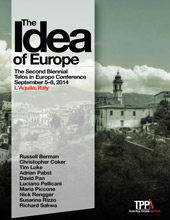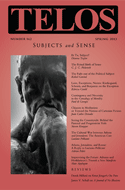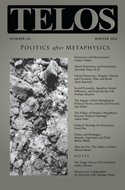By Adrian Pabst · Monday, June 12, 2017 Theresa May’s gamble to call an early election that would deliver a landslide victory badly backfired as the Conservative Party she leads for now ended up losing seats and now requires the support of the Democratic Unionist Party (DUP) of Northern Ireland to stay in power in a “hung parliament” where no party has an outright majority.
Continue reading →
By Adrian Pabst · Wednesday, June 22, 2016 As a German national living in Britain for two decades, I have followed the political debate on whether the UK should stay in, or leave, the European Union (EU) with utter dismay. The two official campaigns have prophesied disaster of biblical proportion in the event of Britain either exiting (Brexit) or remaining (Bremain). Economic doomsday and a return to the violent state of nature in case of Brexit, as the “In” camp would have us believe. Alternatively, subjugation to a sinister super-state and marauding masses of migrants in case of Bremain, so say the “Out” camp.
Continue reading →
By Adrian Pabst · Thursday, September 11, 2014 The following paper was presented at the recent Telos in Europe conference on “The Idea of Europe,” held in L’Aquila, Italy, on September 5–8, 2014.
 The continual crisis in Ukraine is perpetuating an East-West schism that was never overcome after the end of the Cold War. Even if there is no all-out war between the major powers involved in the Ukrainian conflict, Europe faces the distinct prospect of a permanent divide at its very heart. The EU increasingly looks like an annex to the United States, which oscillates between isolationism and interventionism. Meanwhile Russia is fast becoming a vassal state that supplies cheap resources to China. After more than 500 years at the center of international affairs, the whole of Europe is bereft of ideas and incapable of acting as a force for good. The continual crisis in Ukraine is perpetuating an East-West schism that was never overcome after the end of the Cold War. Even if there is no all-out war between the major powers involved in the Ukrainian conflict, Europe faces the distinct prospect of a permanent divide at its very heart. The EU increasingly looks like an annex to the United States, which oscillates between isolationism and interventionism. Meanwhile Russia is fast becoming a vassal state that supplies cheap resources to China. After more than 500 years at the center of international affairs, the whole of Europe is bereft of ideas and incapable of acting as a force for good.
Continue reading →
By Adrian Pabst · Wednesday, May 29, 2013 Adrian Pabst’s “Athens, Jerusalem, and Rome: A Reply to Luciano Pellicani” appears in Telos 162 (Spring 2013). Read the full version online at the Telos Online website, or purchase a print copy of the issue in our store.
 According to Luciano Pellicani, the U.S. culture wars are grounded in a perpetual struggle between the enlightening forces of reason and democracy, on the one hand, and the dark forces of faith and theocracy, on the other hand. Accordingly, he claims that the Puritans sought to establish a medieval collectivist theocracy, not a modern market democracy, and that the U.S. “culture war” between enlightened secular liberalism and reactionary religious conservatism ultimately rests on the perpetual battle between Athenian reason and the faith of Jerusalem. According to Luciano Pellicani, the U.S. culture wars are grounded in a perpetual struggle between the enlightening forces of reason and democracy, on the one hand, and the dark forces of faith and theocracy, on the other hand. Accordingly, he claims that the Puritans sought to establish a medieval collectivist theocracy, not a modern market democracy, and that the U.S. “culture war” between enlightened secular liberalism and reactionary religious conservatism ultimately rests on the perpetual battle between Athenian reason and the faith of Jerusalem.
Continue reading →
By Adrian Pabst · Tuesday, February 12, 2013 Pope Benedict XVI’s resignation was certainly sudden but not altogether unexpected. During the pontificate of his predecessor, the then Cardinal Ratzinger seems to have advised the long-suffering Pope John Paul II to renounce the Petrine office. Crucially, in mid-2010 Benedict gave a strong indication that he was considering abdicating. On April 29, 2009, he left his pallium—the sign of Episcopal authority—on the tomb of Pope Celestine V in the Basilica Santa Maria di Collemaggio, in L’Aquila. In the same location Celestine had been crowned pontiff on August 29, 1294—an event that is commemorated as the festival of Perdonanza Celestinana in the earthquake-stricken city every August 28–29. It is unlikely that Benedict’s highly symbolic gesture was a random act. Clearly he felt a deep spiritual connection with the studious monk-pope Celestine, who abdicated in 1295.
Continue reading →
By Adrian Pabst · Thursday, January 31, 2013 Adrian Pabst’s “The Politics of Paradox: Metaphysics beyond ‘Political Ontology'” appears in Telos 161 (Winter 2012). Read the full version online at the Telos Online website, or purchase a print copy of the issue in our store.
 Since the onset of the Enlightenment, much of modern thought has celebrated the end of metaphysics and the death of God. The project of “political ontology,” which combines post-metaphysical with post-theistic thinking, underpins the scientific rationalism that pervades contemporary philosophy and politics. Faced with the secular slide into skepticism, relativism, and nihilism, this essay argues that the only genuine alternative to “political ontology” is a metaphysical politics of paradox. Philosophically, modernity and postmodernity invented and intensified the onto-theological science of transcendental ontology that can be traced to Scotus, Ockham, Machiavelli, and Suárez. They bequeathed three currents—possibilism, transcendentalism, and absolutism—that flow through figures such as Descartes, Wolff, and Clauberg to Kant, Hegel, and Comte. Since the onset of the Enlightenment, much of modern thought has celebrated the end of metaphysics and the death of God. The project of “political ontology,” which combines post-metaphysical with post-theistic thinking, underpins the scientific rationalism that pervades contemporary philosophy and politics. Faced with the secular slide into skepticism, relativism, and nihilism, this essay argues that the only genuine alternative to “political ontology” is a metaphysical politics of paradox. Philosophically, modernity and postmodernity invented and intensified the onto-theological science of transcendental ontology that can be traced to Scotus, Ockham, Machiavelli, and Suárez. They bequeathed three currents—possibilism, transcendentalism, and absolutism—that flow through figures such as Descartes, Wolff, and Clauberg to Kant, Hegel, and Comte.
Continue reading →
|
|
 The continual crisis in Ukraine is perpetuating an East-West schism that was never overcome after the end of the Cold War. Even if there is no all-out war between the major powers involved in the Ukrainian conflict, Europe faces the distinct prospect of a permanent divide at its very heart. The EU increasingly looks like an annex to the United States, which oscillates between isolationism and interventionism. Meanwhile Russia is fast becoming a vassal state that supplies cheap resources to China. After more than 500 years at the center of international affairs, the whole of Europe is bereft of ideas and incapable of acting as a force for good.
The continual crisis in Ukraine is perpetuating an East-West schism that was never overcome after the end of the Cold War. Even if there is no all-out war between the major powers involved in the Ukrainian conflict, Europe faces the distinct prospect of a permanent divide at its very heart. The EU increasingly looks like an annex to the United States, which oscillates between isolationism and interventionism. Meanwhile Russia is fast becoming a vassal state that supplies cheap resources to China. After more than 500 years at the center of international affairs, the whole of Europe is bereft of ideas and incapable of acting as a force for good.  According to
According to  Since the onset of the Enlightenment, much of modern thought has celebrated the end of metaphysics and the death of God. The project of “political ontology,” which combines post-metaphysical with post-theistic thinking, underpins the scientific rationalism that pervades contemporary philosophy and politics. Faced with the secular slide into skepticism, relativism, and nihilism, this essay argues that the only genuine alternative to “political ontology” is a metaphysical politics of paradox. Philosophically, modernity and postmodernity invented and intensified the onto-theological science of transcendental ontology that can be traced to Scotus, Ockham, Machiavelli, and Suárez. They bequeathed three currents—possibilism, transcendentalism, and absolutism—that flow through figures such as Descartes, Wolff, and Clauberg to Kant, Hegel, and Comte.
Since the onset of the Enlightenment, much of modern thought has celebrated the end of metaphysics and the death of God. The project of “political ontology,” which combines post-metaphysical with post-theistic thinking, underpins the scientific rationalism that pervades contemporary philosophy and politics. Faced with the secular slide into skepticism, relativism, and nihilism, this essay argues that the only genuine alternative to “political ontology” is a metaphysical politics of paradox. Philosophically, modernity and postmodernity invented and intensified the onto-theological science of transcendental ontology that can be traced to Scotus, Ockham, Machiavelli, and Suárez. They bequeathed three currents—possibilism, transcendentalism, and absolutism—that flow through figures such as Descartes, Wolff, and Clauberg to Kant, Hegel, and Comte. 






